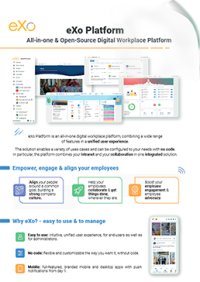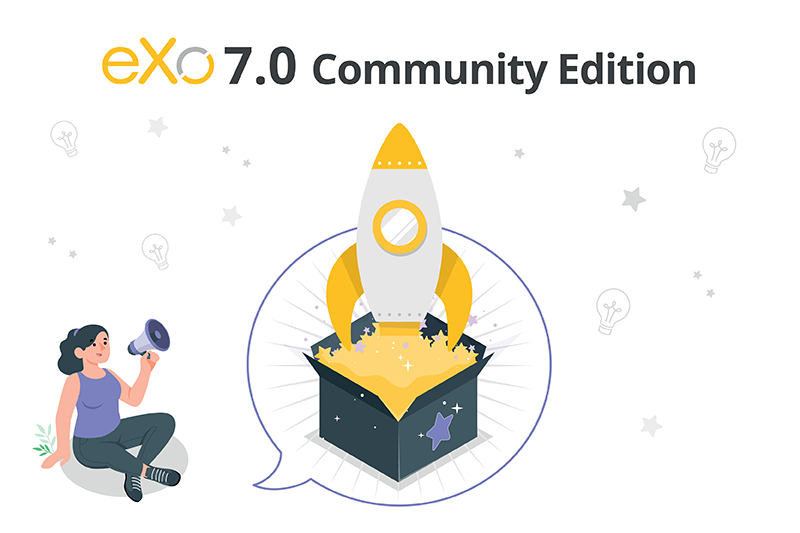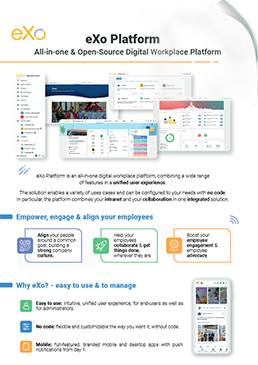

FREE DATASHEET
Download the eXo Platform Datasheet and discover all the features and benefits
Following last month release of our major eXo Platform 7.0 version, we are excited to announce the release of eXo Platform Community Edition 7.0 .
This edition includes a lot of changes compared to the previous Community Edition 6.5, in terms of new features but also in terms of features packaged by default.

In its core, the community edition is based on the same code-base as the enterprise edition. The new version ships with many new features and capabilities, such as :
All new capabilities are described and illustrated in the release blog here.
The version ships with upgrades for all components, introducing in particular
The 7.0 version also upgrades all functional components incorporating :
Contrary to eXo Platform CE 6.5, eXo Platform CE 7.0 ships with document editing capabilities, packaging the OnlyOffice add-on by default.
Online editing will be limited by OnlyOffice open-source limitation – currently up to 20 simultaneously opened documents.
The edition ships with a new videoconferencing add-on. The latter allows to set-up videoconferencing links (rooms/people) throughout the platform and helps managing multiple video-conferencing providers.
With 7.0, eXo Platform changes its chat module to a brand-new one, based on the open-source Matrix component.
Contrary to the 6.5 version, this new add-on is not packaged by default, but is open-source and available for packaging.
The video-conferencing add-on, based on Jitsi, introduces videoconferencing capabilities throughout the platform via various call points – in the profile cards but also in events etc – for an optimum user experience.
This add-on is not packaged by default, but is open-source and available for packaging.
Security add-ons such as (2FA by zone, data leak protection, etc) are not available for packaging.
Many other add-ons are available for email, personal calendar, personal drive, translating services, anti-virus apps, etc.
Some add-ons are open-source and available for packaging, others are closed source, depending on the third party app licensing policies.
The add-ons manager helps deploying an add-on in the platform. The add-ons manager is not available for the Community Edition.
eXo follows an open-core model.
Both eXo Platform Community and Enterprise editions are based on the same code base.
The Enterprise edition:
Both editions ship with an upgrade plugin helping upgrade your 6.5 instance to the 7.0 version.
eXo is changing its maintenance policy with 7.0 versions – from now on, community editions will benefit from maintenance releases.
As before, SLA support is only available for the EE edition.
As before, on demand services from the editor are only available for the enterprise customers.
Below is a comparison table summing up previous points:
| Core features | Included (default package) | Included (default package) |
| Online editing | Included (default package) | Included (default package) |
| Chat | Open-source add-on | Included (default package) |
Video-conferencing
| Included (default package) open-source add-on | Included (default package) Included (default package) |
Enhanced security
| Open-source or closed source add-ons | Open-source or closed source add-ons |
| Third party connectors | Open-source or closed source add-ons | Open-source or closed source add-ons |
| Add-on manager | ||
| Migration manager | ||
| Maintenance | ||
| Support | ||
| On demand services |
The version is available for download (docker compose) with updated technical documentation here :

eXo Platform : The Open-Source
Digital Workplace Platform
Download the eXo Platform Datasheet and discover all the features and benefits


Download the eXo Platform Datasheet and discover all the features and benefits
( Your e-mail address will not be published)
I am the Chief Executive Officer of eXo Platform (the open source digital workplace platform), a company that I co-founded while in college and that I came back to after several years in the banking and consulting industry. I blog about modern work, about open-source and sovereignty issues. Occasionally, I also blog about my personal areas of interest, such as personal development, work–life balance, sustainability and gender equality.